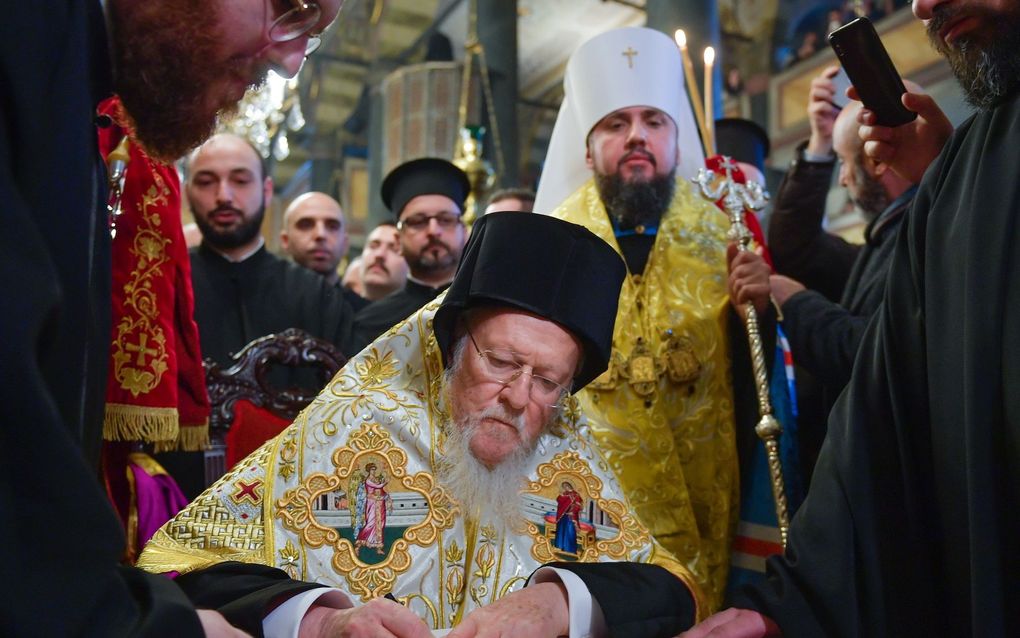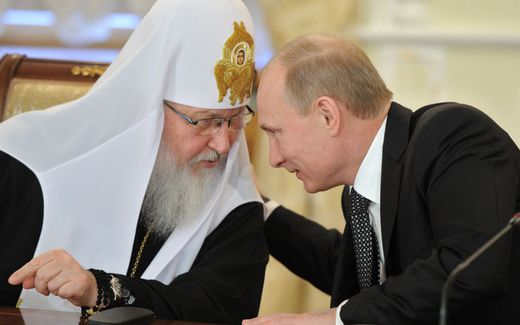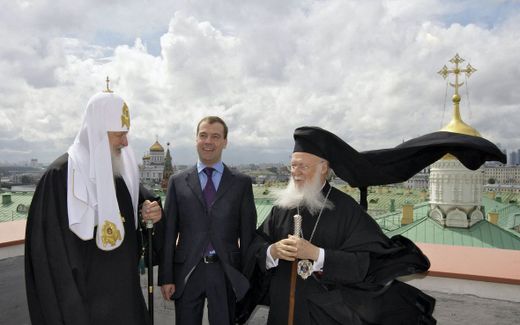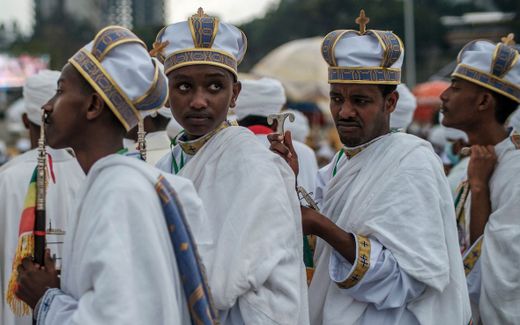Why has the Orthodox Church a central role in the Russian-Ukrainian conflict?

Patriarch Bartholomew signing the act of autonomy for the Orthodox Church of Ukrainia (OCU) in Kyiv, January 2019. Photo EPA, Mykola Lazarenko
Eastern Europe
Unity, that’s what the Eastern Orthodox Church pretend. One belief, one church and one leadership. At the moment, a deep conflict is splitting the Russian church. Six questions about what is going wrong.
What is happening in the Orthodox church?
The Moscow Patriarchate of the Russian Orthodox Church is creating an exarchate (church province) in Africa. That would not be so much of a problem if there were no Patriarchate in Alexandria already for leading the Orthodox Church on the African continent.
Moscow is doing this because 102 priests from the Southern continent had asked for that, according to the official voice from Russia. These 102 clergymen could not agree with the Patriarch from Alexandria, Theodore II, in recognising the autonomy of the Ukrainian Orthodox Church.
Since the independence of Ukraine as a country in 1991, there has always been a debate whether the church in Ukraine should be independent of the Moscow Patriarchate (MP) as well.
From the Russian point of view, Ukraine is not a country but a region within the Russian Empire. Historically this sounds logical. (The) Ukraine is the birthplace of Russia. The Russian nation was born in the so-called Kyiv Rus, after the year 882. And King Vladimir was converted to Christianity in 988 and (possibly) baptised in Crimea. So, Ukraine is where the cradle of the Russian state is.
Officially, Russia signed for the independence of Ukraine in the Memorandum of Budapest in 1994. But that was during a dark period in Russian history. Both country and nation were on the edge of survival. Under the present leader, President Putin, the nation’s self-esteem came back again. The annexation of Crimea in 2014 proved that Russia had never really accepted the Ukrainian independence as a fact.
In 2018, the Ukrainian President Poroshenko negotiated with the Ecumenical Patriarch Bartholomew about’ his’ church’s autonomy (“autocephaly”). Early 2019, this was granted by the Orthodox ‘Pope’. The Kyiv Patriarchate (KP) has been recognised for its leadership over the Orthodox Church of Ukraine (OCU). Together with this, the OCU merged with some other Orthodox groups.
KP Metropolitan Epiphanius said recently that about 700 local churches stepped over to the newly recognised church. That is not more than 10 per cent of the total 7,000 parishes. The others still see the Moscow Patriarchate as the place where they belong. That means the independent Ukrainian church still has a long way to go.
After 2019, the Russian Patriarch Kirill has ceased contact with Constantinople. He speaks about a schismatic act. And the acceptance of the 102 African priests underlines that this is serious business for Moscow.
Is that really a split, or perhaps more a little conflict?
Denying that this is a new schism is the same as denying the coronavirus, the leader of the Albanian Orthodox Church, Archbishop Anastasios, said. By using the word schism, the archbishop is taking you a thousand years back to 1054.
In that year, the church broke into two: the Western church, with the centre in Rome, and the Eastern church, with the centre in Constantinople (Istanbul). This is still known as the Great Schism.
After these thousand years, things in the church have not really changed. The Bishop of Rome (Pope Francis) is still the head of the Roman Catholic Church, and the Ecumenical Patriarch of Constantinople (Archbishop Bartholomew) is still the “first among equals” of the Eastern Orthodox Church.
Saying that the conflict is like the virus is not saying that the split will be forever. Since nobody knows whether the coronavirus will remain harmful for long, nobody knows how the situation in the church will develop. But for the short term, the prospect is not very good.
How can such a problem arise in a church where unity is so essential?
There is a different interpretation of who decides about the autonomy of churches. The Ecumenical Patriarch Bartholomew says that that is his prerogative. But Moscow says that the synods and councils had to be heard before taking such a decision.
From the ages, it has been known that the question of “autocephaly” has always been connected with politics and tension. It does not happen very often that new patriarchates are created. It has never been self-evident that a church had to be autonomous or not. From that perspective, it is business as usual.
It is good to know that the Eastern Orthodox Church is not a centralised ‘empire’, what could be said of the Roman Catholic Church. The Orthodox family consists of independent regional churches that work together but decide for themselves about language, calendar and other issues.

How important is Moscow in the Orthodox church family?
Historically, the Russian church province is the youngest child in the family (from 1439, compared with Alexandria in 325). But speaking about size, the Moscow Patriarchate is the largest and the richest in the world. The membership of the church is said to be at least 100 million.
A Greek church expert last week, therefore, spoke about “almost endless resources” for the Russian church. That implies that Moscow can build a new church in every Ukrainian parish stepping over to Kyiv. Also, Patriarch Kirill can send as many people to Africa as he wants. Not many churches can do that.
To what extent has politics a role in this?
The Russian church has never been far from the Kremlin. The separation of church and state is the Western philosophy. Symphonia (cooperation) of both is the keyword in Eastern Orthodox Social Teaching. For this, they refer to the Old Testament figures of Melchisedek and the brothers Aaron and Moses. Church and Kremlin work together nowadays as State and Party during the Soviet era.
For the Russian government, the church is used as society’s “moral conscience”. The Patriarch is present at many official occasions of the President. Comparable with trade unions and civil organisations for governments in the West.
Don’t think this is different in Ukraine. In 2018, President Poroshenko took the lead in getting the autonomy for the church. In a system with separation of church and state, a president would never have interfered with such an issue.
Related Articles






